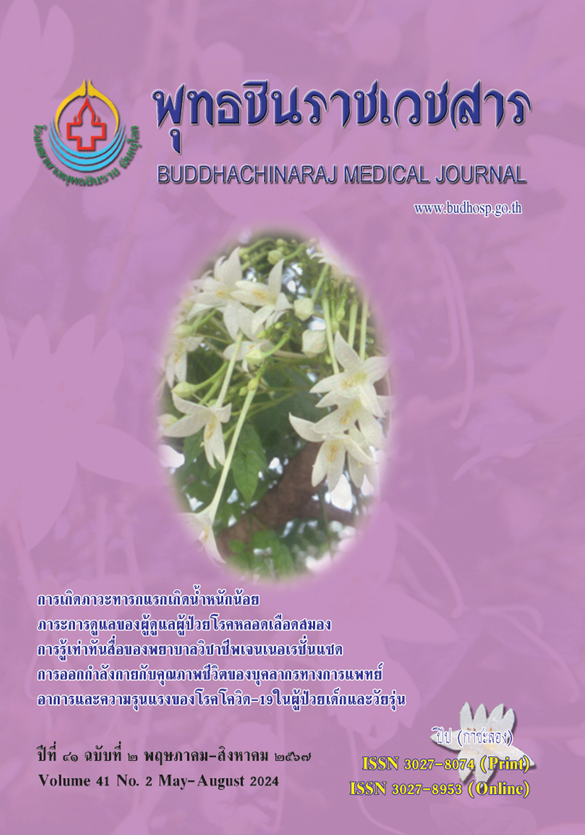ปัจจัยที่มีอิทธิพลต่อการรู้เท่าทันสื่อของพยาบาลวิชาชีพเจนเนอร์เรชั่นแซด ในโรงพยาบาลศูนย์
การรู้เท่าทันสื่อของพยาบาลวิชาชีพเจนเนอร์เรชั่นแซด
คำสำคัญ:
การรู้เท่าทันสื่อ, พยาบาลวิชาชีพเจนเนอเรชั่นแซด, ปัจจัยที่มีอิทธิพลบทคัดย่อ
พยาบาลวิชาชีพใช้สื่อสังคมออนไลน์ในการทำงานทั้งด้านบริหาร ด้านบริการ และด้านวิชาการ แต่พบว่าใช้สื่อสังคมออนไลน์ในทางที่ไม่เหมาะสมทั้งด้านการเข้าถึงสื่อ การเลือกใช้สื่อที่ขาดความน่าเชื่อถือ ขาดการประเมินค่าสื่อ และการสร้างสื่อที่ไม่เหมาะสม ทำให้เกิดการร้องเรียนฟ้องร้อง เสียหายทั้งส่วนตัวและองค์กร โดยเฉพาะพยาบาลวิชาชีพเจนเนอเรชั่นแซดซึ่งเป็นกลุ่มที่สื่อสารแบบสังคมออนไลน์มากที่สุด การวิจัยเชิงพยากรณ์ครั้งนี้มีวัตถุประสงค์เพื่อประเมินระดับการรู้เท่าทันสื่อและปัจจัยที่มีอิทธิพลต่อการรู้เท่าทันสื่อของพยาบาลวิชาชีพเจนเนอเรชั่นแซดในโรงพยาบาลศูนย์ โดยศึกษาในพยาบาลวิชาชีพเจนเนอเรชั่นแซด 174 คน เครื่องมือที่ใช้ในงานวิจัยนี้ คือ แบบสอบถามการรู้เท่าทันสื่อ วิเคราะห์ข้อมูลด้วยการวิเคราะห์การถดถอยพหุคูณแบบเป็นขั้นตอน ซึ่งพบว่าระดับการรู้เท่าทันสื่อโดยรวมของพยาบาลวิชาชีพเจนเนอเรชั่นแซดอยู่ในระดับมาก ปัจจัยภายในบุคคล ได้แก่ การเลือกเปิดรับสื่อ การคิดวิจารณญาณ และปัจจัยสภาพแวดล้อมมีอิทธิพลต่อการรู้เท่าทันสื่อของพยาบาลวิชาชีพเจนเนอเรชั่นแซดร้อยละ 58.8 อย่างมีนัยสำคัญทางสถิติ ดังนั้นผู้บริหารสามารถนำผลการวิจัยในประเด็นของการคิดวิจารณญาณ, การเปิดรับสื่อ, ครอบครัวและตัวแบบที่พบว่ามีอิทธิพลต่อการรู้เท่าทันสื่อมาใช้พัฒนาการรู้เท่าทันสื่อของพยาบาลวิชาชีพเจนเนอเรชั่นแซด
เอกสารอ้างอิง
Srithat E, Ritklang P. Behavior of use and perception of influence of digital media on Generation Y and Generation Z in Bangkok and surrounding areas. Nakhon Ratchasima Coll J 2019;11(3):20-30.
Electronic Transactions Development Agency. Report on the results of the survey of internet user behavior in Thailand [Internet]. Bangkok: Strategy Office Electronic Transactions Development Agency Ministry of Digital Economy and Society; 2022 [cited 2024 Feb 10]. Available from: https://www.etda.or.th/th/Useful-Resource/publications/iub2022.aspx
Euamornvanich P. Social media literacy of Thai adolescences in Bangkok Metropolitan. J Human Social Sci 2018;24(2):22-30.
Suphamanee T, Tana K. Social media networking: Consideration for nurses. Nurs J CMU 2015;42(2):164-78.
UNESCO. Global Media and Information Literacy Assessment Framework. Paris, France: The Institute; 2013.
Wongkumsin T. Media literacy skills media literacy and emotional intelligence of Kasetsart University students. J Soc Sci Human 2019;45(2):127-61.
Bencsik A, Horvath-Csikos G, Juhasz T. Y and Z generation at workplaces. J Competitiveness 2016;8(3):90-106.
Busabong C. Developing a knowing style media literacy in the 21st century for undergraduate students. Sisaket Rajabhat J 2018;40(2):68-79.
Yamane, T. Statistics: An introductory analysis. 3rd ed. New York City, New York State, USA: Harper and Row; 1973.
Srisatidnarakul B. The methodology in nursing research. 5th ed. Bangkok, Thailand: U&I Intermedia Publishing; 2010.
Srisa-at B. New and revised version of basic research. Print the 10th lac. Bangkok, Thailand: Suviriyasan Company Limited; 2017.
Thongrak P. Media literacy skills, code of conduct and mental health of first-year students of undergraduate programs at Kasetsart University. J Human Soc Sci 2019;45(1):1-29.
Nagaoka AC, Santawee K. The factors influencing information and digital media literacy of youth in Bangkok. J Soc Commun Innovat 2019;7(1):55-62.
ดาวน์โหลด
เผยแพร่แล้ว
ฉบับ
ประเภทบทความ
สัญญาอนุญาต
ลิขสิทธิ์ (c) 2024 ``โรงพยาบาลพุทธชินราช พิษณุโลก

อนุญาตภายใต้เงื่อนไข Creative Commons Attribution-NonCommercial-NoDerivatives 4.0 International License.






